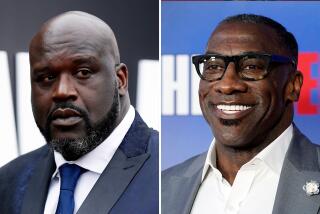Imus’ end could be a hopeful sign
THIS week’s implosion of radio personality Don Imus’ lucrative career has been richly instructive on several levels.
It’s not every day that a talk show host with millions of radio listeners and television viewers loses his job, as Imus did this week, when first MSNBC and then CBS killed his popular and very profitable show.
First, there’s the question of why, after years of similar conduct, Imus’ vulgar and racist insult to the Rutgers University women’s basketball team should have triggered the level of outrage it did.
Partly, that’s a matter of crossing a rather mysterious boundary that snakes invisibly across the media landscape these days. Our current media culture tolerates all sorts of mean-spirited and offensive speech, but every once in a while, the practitioners of invective blunder onto a target that’s just too sympathetic and our collective gag reflex is triggered.
Something similar happened to conservative commentator Ann Coulter, when she insulted the 9/11 widows known as the Jersey Girls. People simply said: That’s it; we’re tired of her and don’t want to hear it anymore. Imus apparently crossed that line when he affronted an accomplished and attractive group of young women, who could have been any proud parents’ daughters.
Then there’s the fact that the one institution in American society that has zero tolerance for racist epithets masquerading as satire is sports. Rush Limbaugh discovered that when he disparaged Philadelphia Eagles quarterback Donovan McNabb. There’s a simple explanation: Competitive sports is one of this country’s pure meritocracies, and the genuinely level playing field that provides has given African Americans a voice there that cannot be ignored because they generate the money on which the whole edifice depends. It’s possible to talk away African American sensibilities in law or medicine or, for that matter, journalism, but not in sports because too many of the people who really have clout are black.
That brings us to another of the things that’s genuinely troubling about the Imus affair. This guy has been doing this stuff for years -- insulting and disparaging not only African Americans but Jews and gays.
This week the Anti-Defamation League distributed a statement pointing out that it has been lodging protests about Imus’ anti-Semitic remarks for years and nothing has been done. There are examples it cites that, frankly, can’t be quoted in this column because they’re too purely offensive, including a characterization of Washington Post columnist Howard Kurtz that’s straight out of Julius Streicher. (He habitually referred to the late Johnnie L. Cochran Jr. with a similarly racist epithet.)
Why did he get away with it?
IT happened because he made millions for his network and syndicators and covered himself with a very shrewd strategy. He positioned himself as the thinking person’s shock jock and, when he wasn’t dishing out racism, prejudice or misogyny, invited onto his show a virtual who’s who of the national news media and publishing elite. Those people were only too happy to ignore their responsibility to call Imus on his reprehensible behavior because they profited from the promotional opportunities his program granted them. He helped sell books and journalists’ careers.
Everybody profited, so long as everybody winked.
This time around -- and to their everlasting credit -- the National Assn. of Black Journalists and the staff of NBC News simply refused to go along with this long-standing gentlemen’s agreement and demanded that Imus be fired.
Then, too, as The Times’ Matea Gold, John Horn and Martin Miller pointed out Thursday, new media -- in the form of Internet video sites -- was around to make the precise moment of Imus’ affront available for all to see and judge for themselves. There was no need to rely on memory or fragmentary transcripts. It’s another and salutary example of the accountability the digital regime is enforcing on other media.
We Americans are an unquenchably optimistic people, and our news media can’t report even the most wrenching or distasteful controversy without finding “signs of hope” somewhere in the muck. (At some point, we really ought to consider replacing the eagle as our national symbol with, say, Alfred E. Neuman.) It would be comforting, for example, to think that the revulsion expressed over Imus’ bigotry marked, if not a turning point, the beginning of one.
For some time now, our national conversation -- as expressed in entertainment and commentary -- has become increasingly coarse, vulgar, violent and just plain mean. Earlier this week, a group of bloggers concerned about the use of threats and harassment by a troublesome minority of people who avail themselves of that medium proposed a voluntary code of civility for the Internet. Now, there’s the nearly universal revulsion over Imus’ abuse of talk radio and, taken together, it’s tempting to hope that his fate and the bloggers’ initiative represent, if not a turn of the tide, at least its limit.
And yet....
For that to be true, a couple of things would have to happen:
One is something a considerable number of African American commentators and journalists have mentioned over the past few days. Part of what made Imus’ remark doubly grating was his appropriation of language routinely used by black musicians and entertainers. (Is there anything even remotely lamer than some shaggy old white guy trying to sound like a Piru Blood?) Whatever value that language may have had as a way to mock white racism, it was exhausted long ago. It’s time to stop it, but that will require a greater number of young African American artists to assume responsibility for their expression and a greater number of parents, both black and white, to discipline their children’s tastes.
One of the absolute lessons of the Imus debacle is that, if we wait for the guys in suits -- whatever their color -- to do this for us, we’ll all wallow in filth and vulgarity for the rest of our lives. When there’s a dollar to be had, these guys would poison their own children without ever losing a minute’s sleep -- let alone, yours and mine.
The other thing that needs to happen is that more Americans need to admit that we’ve developed a kind of collective taste for the kind of nasty vulgarity Imus and the rest of his ilk have been spewing for years now. There’s a kind of guilty pleasure to be had from listening to or watching this kind of thing, sort of a cheap -- but, ultimately -- corrosive thrill.
For the Imus scandal to constitute a real turning point in our national conversation, a substantial number of Americans would have to decide to renounce the mean-spirited pleasure of ridiculing or reviling people rather than misconduct.
Is that likely to happen?
In the two days this week before MSNBC bit the bullet and killed its television broadcast of Imus’ radio program, its audience doubled.
Maybe that was simply an exercise in the same kind of curiosity that makes people slow to gawk at freeway accidents. Maybe....
More to Read
Get our high school sports newsletter
Prep Rally is devoted to the SoCal high school sports experience, bringing you scores, stories and a behind-the-scenes look at what makes prep sports so popular.
You may occasionally receive promotional content from the Los Angeles Times.






